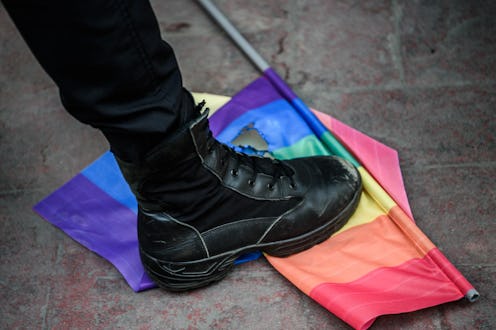News
Why An Attack On A Gay Bar In 1973 Matters Today
For members of the LGBT community and their allies, annual gay "pride" celebrations and parades in the month of June commemorate a sad event: the Stonewall riots of June 28, 1969, in which a group of bar patrons at the Stonewall Inn in the Greenwich Village neighborhood of Manhattan rioted against police raids of the Mafia-owned bar. Known as "the first pride," Stonewall became a symbol of political LGBT sentiment. What fewer people know, however, is that just four years later, another atrocity happened at another gay bar during pride month: an arson at the UpStairs Lounge in New Orleans on June 24, 1973 that killed 32 people. It was the largest-scale killing of LGBT people until the Pulse nightclub shooting in Orlando on June 12.
Although the scale of the UpStairs arson should have been sufficient to enter it into the cannon of LGBT history, few people know about this tragic event. Robert Camina, a filmmaker who directed a documentary about the UpStairs massacre titled Upstairs Inferno, said in an interview with VICE that he was shocked to learn about this overlooked tragedy so late in life:
One of my executive producers is from Louisiana. He began to tell me about the Upstairs fire and I was shocked because I thought I knew my gay history, and I knew nothing about this. It's as poignant as the Stonewall Inn raid, but it's not part of our LGBT narrative.
The details of the UpStairs arson are chilling on their own, and more so when viewed in light of the Orlando Pulse massacre. Of the 32 people who died in the fire, three men remain unidentified. The outpouring of love and support toward the Orlando gay community and the LGBT community at large stands in stark contrast to New Orleans' abominable reaction to their similar tragedy. Medical and police first-responders made disgusting jokes about the victims of the fire; the Catholic Church (a powerful presence in New Orleans) made no gestures or announcements of support; many churches wouldn't allow gay victims to be buried in their cemeteries; some families wouldn't claim their gay relatives; and local media only gave the fire cursory day-of coverage.
Times were different, of course; homosexuality was only taken out of the Diagnostic and Statistical Manual of Mental Disorders, the psychology community's anthology of mental illness, in 1987, but the response seems callous even for the deep South in the '70s.
Perhaps the most important takeaways from the UpStairs arson are how far America has come since the beginning of the gay rights movement and how deep the seeds of homophobia have been sowed. As we celebrate our LGBT pride this month and honor the victims of the still-fresh Pulse massacre, we must also honor the 32 people we lost in New Orleans in 1973, and all those killed in hate crimes before and since. They lost not only their lives and families, but, until the past few years, their legacy as well.
